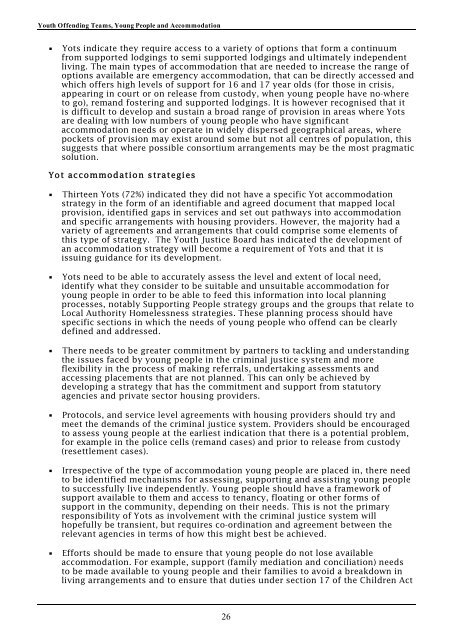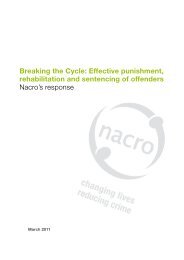Youth offending teams, young people and accommodation - Nacro
Youth offending teams, young people and accommodation - Nacro
Youth offending teams, young people and accommodation - Nacro
You also want an ePaper? Increase the reach of your titles
YUMPU automatically turns print PDFs into web optimized ePapers that Google loves.
<strong>Youth</strong> Offending Teams, Young People <strong>and</strong> Accommodation<br />
� Yots indicate they require access to a variety of options that form a continuum<br />
from supported lodgings to semi supported lodgings <strong>and</strong> ultimately independent<br />
living. The main types of <strong>accommodation</strong> that are needed to increase the range of<br />
options available are emergency <strong>accommodation</strong>, that can be directly accessed <strong>and</strong><br />
which offers high levels of support for 16 <strong>and</strong> 17 year olds (for those in crisis,<br />
appearing in court or on release from custody, when <strong>young</strong> <strong>people</strong> have no-where<br />
to go), rem<strong>and</strong> fostering <strong>and</strong> supported lodgings. It is however recognised that it<br />
is difficult to develop <strong>and</strong> sustain a broad range of provision in areas where Yots<br />
are dealing with low numbers of <strong>young</strong> <strong>people</strong> who have significant<br />
<strong>accommodation</strong> needs or operate in widely dispersed geographical areas, where<br />
pockets of provision may exist around some but not all centres of population, this<br />
suggests that where possible consortium arrangements may be the most pragmatic<br />
solution.<br />
Yot <strong>accommodation</strong> strategies<br />
� Thirteen Yots (72%) indicated they did not have a specific Yot <strong>accommodation</strong><br />
strategy in the form of an identifiable <strong>and</strong> agreed document that mapped local<br />
provision, identified gaps in services <strong>and</strong> set out pathways into <strong>accommodation</strong><br />
<strong>and</strong> specific arrangements with housing providers. However, the majority had a<br />
variety of agreements <strong>and</strong> arrangements that could comprise some elements of<br />
this type of strategy. The <strong>Youth</strong> Justice Board has indicated the development of<br />
an <strong>accommodation</strong> strategy will become a requirement of Yots <strong>and</strong> that it is<br />
issuing guidance for its development.<br />
� Yots need to be able to accurately assess the level <strong>and</strong> extent of local need,<br />
identify what they consider to be suitable <strong>and</strong> unsuitable <strong>accommodation</strong> for<br />
<strong>young</strong> <strong>people</strong> in order to be able to feed this information into local planning<br />
processes, notably Supporting People strategy groups <strong>and</strong> the groups that relate to<br />
Local Authority Homelessness strategies. These planning process should have<br />
specific sections in which the needs of <strong>young</strong> <strong>people</strong> who offend can be clearly<br />
defined <strong>and</strong> addressed.<br />
� There needs to be greater commitment by partners to tackling <strong>and</strong> underst<strong>and</strong>ing<br />
the issues faced by <strong>young</strong> <strong>people</strong> in the criminal justice system <strong>and</strong> more<br />
flexibility in the process of making referrals, undertaking assessments <strong>and</strong><br />
accessing placements that are not planned. This can only be achieved by<br />
developing a strategy that has the commitment <strong>and</strong> support from statutory<br />
agencies <strong>and</strong> private sector housing providers.<br />
� Protocols, <strong>and</strong> service level agreements with housing providers should try <strong>and</strong><br />
meet the dem<strong>and</strong>s of the criminal justice system. Providers should be encouraged<br />
to assess <strong>young</strong> <strong>people</strong> at the earliest indication that there is a potential problem,<br />
for example in the police cells (rem<strong>and</strong> cases) <strong>and</strong> prior to release from custody<br />
(resettlement cases).<br />
� Irrespective of the type of <strong>accommodation</strong> <strong>young</strong> <strong>people</strong> are placed in, there need<br />
to be identified mechanisms for assessing, supporting <strong>and</strong> assisting <strong>young</strong> <strong>people</strong><br />
to successfully live independently. Young <strong>people</strong> should have a framework of<br />
support available to them <strong>and</strong> access to tenancy, floating or other forms of<br />
support in the community, depending on their needs. This is not the primary<br />
responsibility of Yots as involvement with the criminal justice system will<br />
hopefully be transient, but requires co-ordination <strong>and</strong> agreement between the<br />
relevant agencies in terms of how this might best be achieved.<br />
� Efforts should be made to ensure that <strong>young</strong> <strong>people</strong> do not lose available<br />
<strong>accommodation</strong>. For example, support (family mediation <strong>and</strong> conciliation) needs<br />
to be made available to <strong>young</strong> <strong>people</strong> <strong>and</strong> their families to avoid a breakdown in<br />
living arrangements <strong>and</strong> to ensure that duties under section 17 of the Children Act<br />
26

















